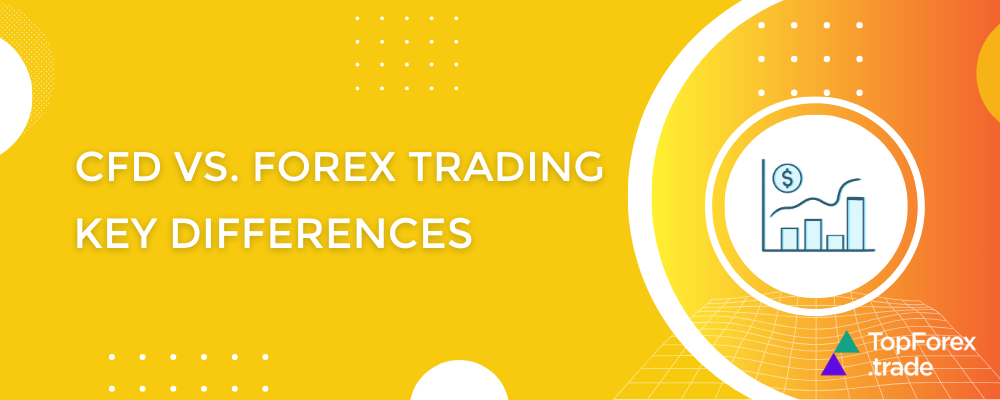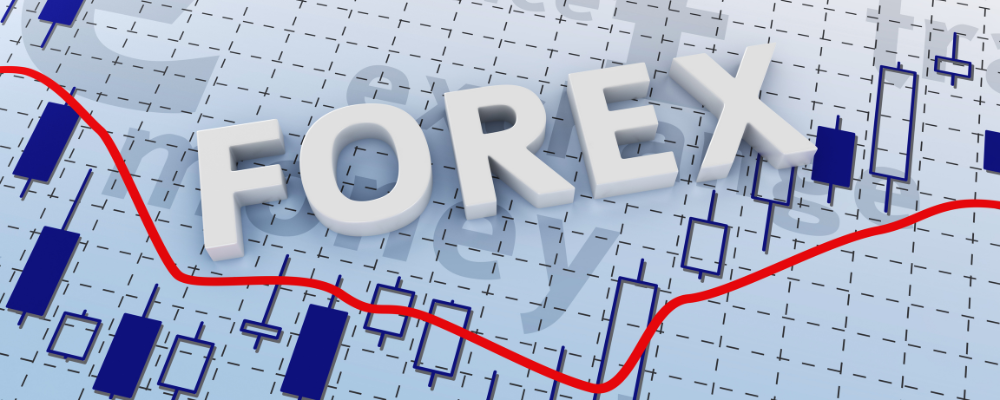Understanding CFD and Forex trading: key differences and best brokers

When stepping into the financial markets, traders often have to choose between different trading options. Two popular choices are Contracts for Difference (CFDs) and Forex trading. While both can be profitable, they are suited to different trading styles and risk levels. Knowing the key differences between CFD trading and Forex trading is essential for making smart trading decisions. In this article, we’ll break down how each works, the risks they carry, and the unique benefits they offer.
What are CFDs and Forex trading?

- Contracts for difference (CFDs)
CFDs are financial derivatives that allow traders to speculate on the price movements of various assets without actually owning the underlying asset. With CFDs, you can trade various markets, including stocks, commodities, indices, and even cryptocurrencies. The key feature of CFD trading is that you can profit from both rising and falling markets by buying (going long) or selling (going short) the contract. The difference between the opening and closing price of the CFD determines your profit or loss.
For example, if you believe that Apple’s stock price will rise, you can buy a CFD on Apple stock. If the price goes up, you can sell the CFD for a profit. Conversely, if you think the price will fall, you can sell (short) the CFD, profiting if the stock declines. This flexibility allows traders to take advantage of both upward and downward market trends across different asset classes, including stocks, commodities like gold and oil, indices like the S&P 500, and even cryptocurrencies like Bitcoin.
Pro tip: Check out Apple stock analysis: key indicators and charting tips for beginners
- Forex trading
Forex, or foreign exchange trading, involves the buying and selling of currencies. It’s the largest financial market in the world, with a daily trading volume exceeding $6 trillion.
For instance, if you believe the euro will strengthen against the U.S. dollar, you might buy the EUR/USD currency pair. If the euro’s value rises relative to the dollar, you can sell the pair at a higher rate for a profit. Forex trading revolves around currency pairs like EUR/USD, GBP/JPY, and AUD/CAD, focusing on the fluctuations in exchange rates between these currencies. Unlike CFDs, Forex trading is limited to currencies, making it a specialized form of trading.
Pro tip: Check out Comprehensive analysis of EUR/USD: key indicators, predictions, and trading plan
Key differences between CFD and Forex trading

1. Range of instruments:
- CFD trading: CFDs offer access to a broad array of markets. For example, you can trade CFDs on commodities like crude oil, indices like the FTSE 100, or even shares of companies like Tesla. This variety allows traders to diversify their investments across different types of assets.
- Forex trading: Forex is exclusively about trading currency pairs. For example, you might trade the USD/JPY pair, speculating on whether the U.S. dollar will appreciate against the Japanese yen. While you’re limited to currencies, the Forex market provides deep liquidity and a wide range of pairs to trade.
2. Market focus:
- CFD trading: CFDs cater to traders who want to access multiple markets from a single platform. For instance, you could hold a long position in gold while simultaneously shorting the NASDAQ 100 index, balancing your portfolio across different asset classes.
- Forex trading: Forex trading focuses solely on currency movements. For example, a trader might focus on macroeconomic trends, such as the impact of U.S. Federal Reserve interest rate changes on the USD/CAD currency pair.
3. Trading hours:
- CFD trading: The trading hours for CFDs depend on the underlying asset. For instance, if you’re trading a CFD on the London Stock Exchange, you’re limited to the exchange’s hours. However, some CFDs, like those on commodities such as gold or oil, may trade nearly 24 hours a day.
- Forex trading: Forex markets operate 24 hours a day, five days a week. For example, you can trade the EUR/USD pair during the Asian, European, or North American sessions, allowing for continuous trading across different time zones.
More about Global market trading hours: best time to trade currencies, stocks, commodities, and more
4. Leverage:
- CFD trading: CFDs often come with higher leverage. For instance, with 10:1 leverage, you can control a $10,000 position with just $1,000 of capital. This magnifies both potential gains and losses. If you’re trading a volatile asset like crude oil, leverage can significantly increase your exposure.
- Forex trading: Forex also offers leverage, though it’s usually lower. For example, a 50:1 leverage on a currency pair like EUR/GBP allows you to control a $50,000 position with $1,000. While leverage can enhance profits, it also increases the risk of substantial losses.
Disclaimer: Use leverage cautiously in CFD trading, as it can amplify both gains and losses.
Check out the article Forex trading with leverage and margin explained: how to manage risks and not to lose money.
5. Cost structure:
- CFD trading: Costs in CFD trading can include spreads, commissions, and overnight fees. For example, if you trade a CFD on Google shares, you might pay a small spread and possibly a commission. If you hold the position overnight, you could incur additional financing costs.
- Forex trading: In Forex trading, costs typically come in the form of spreads. For instance, trading the EUR/USD pair might involve a spread of 1-2 pips. Some brokers may also charge commissions, but in many cases, the spread is the primary cost.
6. Risk and volatility:
- CFD trading: The risk in CFD trading varies with the asset. For example, a CFD on Tesla stock might be highly volatile due to market news, leading to quick gains or losses. On the other hand, a CFD on a government bond index might offer more stability but less opportunity for high returns.
- Forex trading: Forex markets can be volatile, especially during major economic events. For instance, if the European Central Bank announces a surprise interest rate cut, the EUR/USD pair could experience significant price swings, offering both risk and opportunity for traders.
Top Forex and CFD brokers
As you navigate the decision between CFD trading and Forex trading, selecting a reliable broker is crucial for your trading success. The right broker can significantly impact your trading experience, from the quality of trade execution to the range of available instruments and the fees you’ll encounter. To help you make an informed choice, we’ve compiled a list of the top Forex and CFD brokers. These brokers have been selected based on their reputation, trading platforms, customer service, and overall value they provide to traders. Whether you’re interested in trading currency pairs, stocks, commodities, or indices, our list will guide you toward brokers that cater to your specific trading needs and preferences.
BlackBull FX and CFD trading
BlackBull Markets is a trustworthy Forex broker that provides a diverse range of trading options, including Forex, CFDs, commodities, currencies, stocks, futures, indices, and cryptocurrencies. This wide selection offers traders numerous opportunities to diversify their portfolios.
Based in Seychelles, BlackBull is regulated to ensure a secure and compliant trading environment. They offer several account types, including standard, prime, institutional, and Islamic (swap-free) accounts, as well as a demo account for risk-free practice.
Traders can use a variety of platforms such as MT4, MT5, cTrader, Web Trader, and TradingView, along with mobile and tablet apps for convenient access. BlackBull also features tools like BlackBull CopyTrader and BlackBull Shares to enhance trading strategies.
For those looking to improve their skills, BlackBull provides an educational hub with webinars and tutorials to support ongoing learning and development.
- One standout feature to note is BlackBull’s competitive spreads, which can significantly impact trading costs and potential profitability.
XTB FX and CFD trading
When it comes to Forex and CFD trading, XTB is a top choice. As a leading broker in the industry, XTB operates in over 190 countries and is recognized for its robust financial security and transparency. It is regulated by esteemed authorities such as the FCA, CySEC, and KNF.
XTB offers an extensive range of trading options with over 1,500 CFDs, covering Forex pairs, indices, commodities, shares, and cryptocurrencies. Their platforms, xStation and MetaTrader 4, are user-friendly and equipped with advanced tools to help you make well-informed trading decisions.
The broker supports various trading styles with account types like Standard and swap-free accounts, each tailored to different needs and fee structures. XTB also provides a comprehensive suite of research and analysis resources, including daily market reports, economic calendars, and webinars, to keep you informed about market trends and key events.
- One notable feature to keep in mind is XTB’s zero-commission trading on certain CFD instruments, which can help reduce overall trading costs and improve your profitability.
Exness FX and CFD trading
Exness is a highly-regarded Forex broker offering a diverse array of trading options, including currency pairs, commodities, indices, and cryptocurrencies.
With regulation from leading authorities such as the FCA in the UK and CySEC in Cyprus, Exness provides a secure and compliant trading environment.
The broker features competitive spreads that vary depending on the account type. Traders can select from Standard and Professional accounts, each offering unique advantages and conditions tailored to different trading needs.
Exness also provides robust customer support through email, live chat, and phone. It supports popular trading platforms like MetaTrader 4 (MT4) and MetaTrader 5 (MT5), known for their user-friendly interfaces and advanced charting tools, ensuring a seamless trading experience.
- A key feature to highlight is Exness’s high leverage options, which can offer greater trading flexibility and potential for higher returns, though it is essential to manage leverage carefully to avoid increased risk.
Plus500 FX and CFDs trading
Plus500 is a well-established online trading platform that specializes in Contract for Difference (CFD) trading. CFDs allow traders to speculate on the price movements of financial instruments without owning the underlying assets.
Plus500 is known for its user-friendly platform, which provides access to a wide range of CFDs, including stocks, indices, commodities, cryptocurrencies, and Forex pairs. This variety enables traders to diversify their portfolios and explore different markets based on their strategies and preferences.
The platform features an intuitive and straightforward interface, making it accessible for both novice and experienced traders. Plus500 also offers a demo account, allowing users to practice trading strategies without any financial risk.
Regulatory compliance is a key strength of Plus500. The platform operates under the regulations of reputable financial authorities, ensuring a secure and transparent trading environment.
- One notable feature of Plus500 is its advanced risk management tools, including stop-loss and take-profit orders, which help traders manage their positions and protect their investments effectively.
82% of retail investor accounts lose money when trading CFDs with this provider. You should consider whether you can afford to take the high risk of losing your money.
HF Markets FX and CFD trading
HF Markets is a standout choice for traders seeking a diverse range of asset trading options. With access to over 1,200 financial instruments, including currency pairs, energies, indices, commodities, ETFs, stocks, and bonds, HF Markets accommodates a wide array of trading needs.
The broker supports multiple trading platforms, including MT4 and MT5, which are available on desktop, web, and mobile devices. Their user-friendly trading app adds convenience, and the VPS service further enhances trading performance.
HF Markets offers a variety of account types, including Premium, Pro, Zero, and Cent accounts, each with different minimum deposits, leverage, and spreads. Beginners can benefit from a demo account to practice strategies and get comfortable with various instruments before investing real money.
- A notable feature to highlight is HF Markets’ comprehensive educational resources, which include webinars, tutorials, and market analysis tools, designed to support traders in developing their skills and strategies.
Related articles:
CFD vs. Forex trading - FAQ